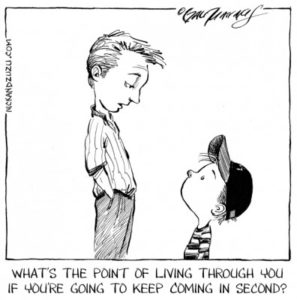I was curious about what was happening on social media yesterday. It was Mother’s Day. God’s good gift of mothers and the power of Godly parenting is what we’ve come to celebrate. . . or at least should be celebrating. I saw plenty of posts thanking and honoring moms. Some were emotion-inducing nods to mothers who are no longer with us. All in all, I don’t think mothers get nearly enough credit for all the hard work of mothering. I’ve seen that hard work play out now in three generations of my own family, and I know it’s nowhere near easy.
There was one curious post I spotted yesterday that brought together faith, family, and some faulty notions that are so prevalent in today’s culture that we actually buy into them. It was from our friend Scotty Smith, who’s known for his short, provocative, theologically sound posts that always force me to think more deeply about things I should be thinking more deeply about. Scotty’s been a friend who consistently preaches the Gospel to me in ways that can rattle me to the core.
Scotty posted this yesterday: “Moms, be free from performance-based motherhood. Jesus is your righteousness, not your kid’s choices, grades, manners, careers, or faith.”

We must constantly be reminding ourselves of this truth: whatever it is that we value most highly, think most about, and invest ourselves in with our time and money. . . that’s our god.
Sadly, I think social media has served to create a world where we not only curate, fabricate, and exhibit ourselves, but we are doing the same things with our kids. The great irony of Scotty’s post was that in my newsfeed, it was sandwiched between a couple of parental posts filled with words and pictures boasting up things like kids’ choices, grades, manners, careers, and faith. The juxtaposition was powerful.
So much of this is about our identity, isn’t it? If someone has a child who does something better than our own and we spot that on social media, our joy is robbed. Perhaps we respond with a thinly veiled volley of posts of our own, all featuring things about our kids that somehow make us feel better about ourselves. Not only does this kind of thing tell us about who we are, but it’s incredibly life-sapping for our kids. Some kids will have the life-sapped out of them by being puffed-up and then put on a fast-track to a lifetime of performance-based living. Our narrative of achievement becomes their life narrative. When this happens, we’ve steered them away from the Gospel. Other kids will have the life-sapped out of them by hearing the strong message that mom and dad’s love is based on my performance. Anyone who’s grown up under the hefty weight of that burden knows just how disabling that can be. I hear heart-breaking stories from these kids all the time.
I often pray that we would pursue a Christlike humility that lets our actions speak for themselves. Perhaps we could offer through the quietness of humble living. . . both online and offline. . . a model for living that seeks to glorify the Creator rather than the created things. Yes, we must nurture our kids into doing their best. But that best needs to be pursued in order to bring glory to God, rather than to give dad and mom something to post.
This morning, I read these words in Paul Tripp’s book, New Morning Mercies: “Every day you look to something to give you life. Every day you give yourself to something in the hope that it will give you peace and joy. Every day you attach your identity to something, and there are only two places to look. You are either looking for life in the creation and are on your way to crushing disappointment, or you are looking to the Creator and are on your way to lasting peace of heart.”
Our kids are not trophies. They are not merit badges. They are not meant to be displayed.